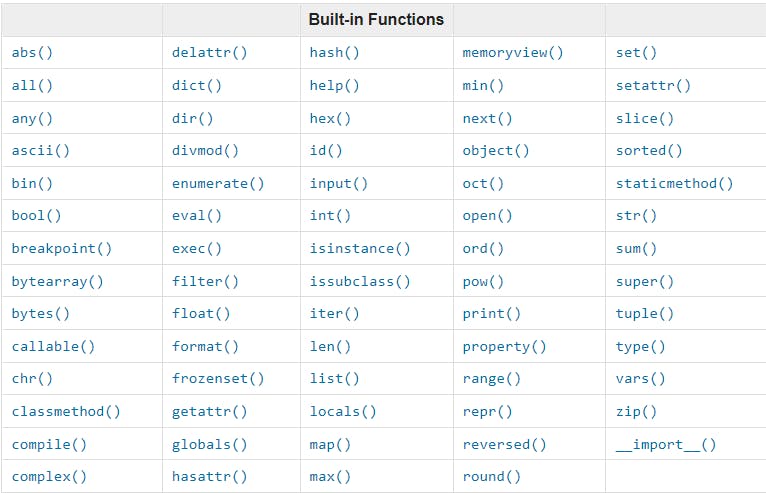The Python interpreter has a number of functions and types built into it that are always available. They are listed here in alphabetical order.

Python abs()
The abs() function returns the absolute value of the given number. If the number is a complex number, abs() returns its magnitude.
number = -20
absolute_number = abs(number)
print(absolute_number)
# Output: 20
20
Python all()
The all() function returns True if all elements in the given iterable are true. If not, it returns False.
boolean_list = ['True', 'True', 'True']
# check if all elements are true
result = all(boolean_list)
print(result)
# Output: True
True
Python any()
The any() function returns True if any element of an iterable is True. If not, it returns False.
boolean_list = ['True', 'False', 'True']
# check if any element is true
result = any(boolean_list)
print(result)
# Output: True
True
Python ascii()
The ascii() method returns a string containing a printable representation of an object. It escapes the non-ASCII characters in the string using \x, \u or \U escapes.
otherText = 'Pythön is interesting'
print(ascii(otherText))
'Pyth\xf6n is interesting'
Python bin()
The bin() method converts and returns the binary equivalent string of a given integer. If the parameter isn't an integer, it has to implement index() method to return an integer.
number = 5
print('The binary equivalent of 5 is:', bin(number))
The binary equivalent of 5 is: 0b101
Python enumerate()
The enumerate() method adds a counter to an iterable and returns it (the enumerate object).
languages = ['Python', 'Java', 'JavaScript']
enumerate_prime = enumerate(languages)
# convert enumerate object to list
print(list(enumerate_prime))
# Output: [(0, 'Python'), (1, 'Java'), (2, 'JavaScript')]
[(0, 'Python'), (1, 'Java'), (2, 'JavaScript')]
Python filter()
The filter() function extracts elements from an iterable (list, tuple etc.) for which a function returns True.
numbers = [1, 2, 3, 4, 5, 6, 7, 8, 9, 10]
# returns True if number is even
def check_even(number):
if number % 2 == 0:
return True
return False
# Extract elements from the numbers list for which check_even() returns True
even_numbers_iterator = filter(check_even, numbers)
# converting to list
even_numbers = list(even_numbers_iterator)
print(even_numbers)
# Output: [2, 4, 6, 8, 10]
[2, 4, 6, 8, 10]
Python map()
The map() function applies a given function to each item of an iterable (list, tuple etc.) and returns an iterator.
numbers = [2, 4, 6, 8, 10]
# returns square of a number
def square(number):
return number * number
# apply square() function to each item of the numbers list
squared_numbers_iterator = map(square, numbers)
# converting to list
squared_numbers = list(squared_numbers_iterator)
print(squared_numbers)
# Output: [4, 16, 36, 64, 100]
[4, 16, 36, 64, 100]
Python pow()
The pow() function returns the power of a number.
# positive x, positive y (x**y)
print(pow(2, 2)) # 4
# negative x, positive y
print(pow(-2, 2)) # 4
# positive x, negative y
print(pow(2, -2)) # 0.25
# negative x, negative y
print(pow(-2, -2)) # 0.25
4
4
0.25
0.25
Python reversed()
The reversed() function returns the reversed iterator of the given sequence.
# for string
seq_string = 'Python'
print(list(reversed(seq_string)))
# for tuple
seq_tuple = ('P', 'y', 't', 'h', 'o', 'n')
print(list(reversed(seq_tuple)))
# for range
seq_range = range(5, 9)
print(list(reversed(seq_range)))
# for list
seq_list = [1, 2, 4, 3, 5]
print(list(reversed(seq_list)))
['n', 'o', 'h', 't', 'y', 'P']
['n', 'o', 'h', 't', 'y', 'P']
[8, 7, 6, 5]
[5, 3, 4, 2, 1]
Python round()
The round() function returns a floating-point number rounded to the specified number of decimals.
number = 13.46
# round the number
rounded_number = round(number)
print(rounded_number)
# Output: 13
13
Python sorted()
The sorted() function sorts the elements of a given iterable in a specific order (ascending or descending) and returns it as a list.
numbers = [4, 2, 12, 8]
sorted_numbers = sorted(numbers)
print(sorted_numbers)
# Output: [2, 4, 8, 12]
[2, 4, 8, 12]
Python zip()
The zip() function takes iterables (can be zero or more), aggregates them in a tuple, and returns it.
languages = ['Java', 'Python', 'JavaScript']
versions = [14, 3, 6]
result = zip(languages, versions)
print(list(result))
[('Java', 14), ('Python', 3), ('JavaScript', 6)]
Note: Find more on Built-in Function
